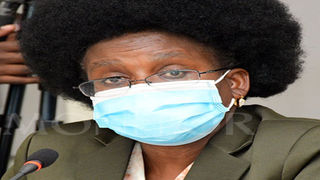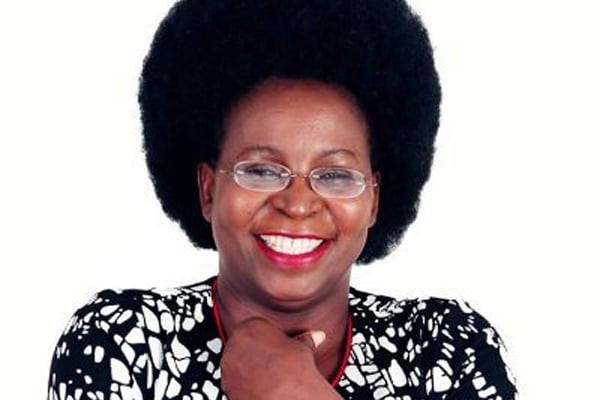
The Minister of Science, Technology and Innovations, Dr Monica Musenero, appears before a select committee of Parliament over allegations of misappropriation of funds on November 18, 2021. PHOTO/DAVID LUBOWA
|National
Prime
How scientists shared Covid-19 vaccines cash
What you need to know:
- Although some Ugandans doubt whether there is the capacity to develop a vaccine, the seeming negativity could also be a result of a delay by government to fulfil its promises.
Government records indicate that scientists at Makerere University, Uganda Virus Research Institute (UVRI) and Joint Clinical Research Centre (JCRC) got the biggest chunk of funds channelled towards the development of Covid-19 vaccines, diagnostics and therapeutics.
The records also show that other scientists from Natural Chemotherapeutics Research Institute (NCRI), Africa centre of excellence in MAT, Presidential Initiative on Banana and Busitema University, benefitted.
Both the Auditor General’s report for 2020/2021, and Dr Monica Musenero, the Minister for Science, Technology and Innovation, indicated that the scientists have made significant progress in all the 23 projects which cost government up to Shs31 billion.
But some legislators and a section of the public have expressed doubt on whether there is any progress in the said projects, majorly on Covid-19 vaccine development, following pronouncements by President Museveni that it would be ready by end of 2021.
Dr Musenero, however, told Daily Monitor that of the Shs31 billion that the Finance Ministry gave to the Ministry of Science, Technology and Innovation for the initiatives, only Shs28.9b was released for the projects.
From the released money, Shs13.2b was given by the Ministry of Science to the selected scientists for operations, a shortfall from the planned Shs15.2 billion. Another 15.8b was used by the Ministry to purchase specialised equipment to support the approved projects in accordance with the original plan.
Dr Musenero, who was then coordinating the scientists as the head of Presidential Scientific Initiative on Epidemics (PRESIDE), told this newspaper that the scientists were selected after an open call for application by the Ministry of Science.
“In April 2020, through an intensive process of Think Tanking, Hackathons and scientific reviews, 23 priority projects were selected for inclusion in a year plan for development of Covid-19 Vaccines, Diagnostics and Therapeutics,” she said.
Hackathons refers to a timed event in which both technical and business teams come together to discuss, scrutinise and collaborate intensively on creative projects.
Dr Musenero said this process took more than six months to build the understanding and refining of the projects.
“The first batch of funding for operational costs for the first set of projects was availed to scientists in September 2020,” she revealed, adding that of the 23 projects for development of Covid-19 vaccines, diagnostics and therapeutics, four were targeting Covid-19 vaccine development.
“The domestic development of Covid-19 vaccines is premised on the understanding that vaccines will be required for generations beyond the initial number required to open the economy for booster doses as well as those under 18 and newborns in future. Local production of vaccines will save the economy money and create employment in the value chain,” the minister said.
But all is not rosy. The Ntungamu Municipality MP, Mr Yona Musinguzi, last year accused Dr Musenero of misusing money for Covid-19 vaccine research.
This prompted a probe by Parliament which is still going on and sources in Parliament say the report is expected to be out by February or March.
Mr Musinguzi said the Shs31 billion that Parliament appropriated to the recently disbanded Ministry of Science, Technology and Innovation for the manufacture of Covid-19 vaccines was channelled towards the Presidential Scientific Initiative on Epidemics (PRESIDE), which he said is not a registered organisation.
“In its definition, it [PRESIDE] should be a company; it is not registered anywhere but it is receiving big sums of money under the disguise of some scientists who have come together to produce for us a coronavirus vaccine,” Mr Musinguzi told Parliament last year in November.
The Ntungamu Municipality MP also accused Dr Musenero of not paying scientists. “On the summary of project disbursements, there is a doctor at Uganda Virus Research Institute whom she [Musenero] purportedly sent Shs1.8 billion but the doctor has never seen the money,” he said. This reporter has not verified this independently but the probe by Parliament is still ongoing.
Ms Aisha Kabanda, a member of the committee set up by deputy Speaker of Parliament Anita Among to investigate the alleged mismanagement of funds, told this newspaper last week that investigations are still going on.
Dr Misaki Wayengera, an immunologist and the head of scientists advising the government on Covid-19,said: “It is good to build capacity in vaccine development but that is a long term investment. Investing in vaccine development in an emergency was not a priority in an emergency like this. The priority was how do we deliver it [vaccines].”
The expert also accused Dr Musenero of leaving out some experts in developing vaccines.
Hope for a vaccine
Although some Ugandans doubt whether there is the capacity to develop a vaccine, the seeming negativity could also be a result of a delay by government to fulfil its promises.
President Museveni in June last year while opening the World Health Summit 2021 in Kampala, announced that that a locally-developed Covid-19 vaccine will be ready by end of 2021 to help the country combat the health and economic impacts of the pandemic. But this did not happen.
“This selfishness in the world [where countries are refusing to share vaccines] is bad but it is also good, it wakes up Africans... Our researchers are now entering stage five and by November, they will be in stage eight. I can assure you that by the end of 2021, we shall no longer be waiting for outsiders to rescue us from mass deaths,” the President said.
The committee led by Mr Xavier Kyooma, wants Dr Musenero to give accountability for the money but Musenero said it was the role of disbanded Permanent secretary of the Ministry of Science and Technology to give the accountability and not PRESIDE. Dr Musenero was appointed minister after leading PRESIDE.
Mr Kyooma earlier said: “The issue of accountability for Covid-19 funding was squarely under the Ministry of Science, Technology and Innovation (Mosti), and not PRESIDE. This would mean we don’t demand accountability from you. The MoU between PRESIDE and the ministry says to account to Mosti all the money advanced by Mosti as by relevant laws...It implies that actually, you have some accountability to make and we are basing on this to request for accountability.”
Musenero response
In an interview with this newspaper yesterday, Dr Musenero dispelled the allegations of mismanagement of funds, saying the money was put to appropriate use.
Minister Musenero’s position is partly reinforced by the Audit report released on Wednesday by the Auditor General, Mr John Muwanga, which indicated that the money was not mismanaged.
Dr Musenero said: “The money for development of Covid-19 vaccines, diagnostics and therapeutics is an investment. Because of the dedication of our scientists, the first one received money around October 2020, but by the time we reached June 2021 he had finished animal trials. That is a supersonic speed!”
“There is no money that has been eaten. The money has been invested and I am committed to this process to ensure that Ugandans benefit from every shilling invested in the research,” she said.
The minister said they would soon to start mass commercial production of the diagnostic kits that were developed by the researchers using the funds.
“For our first diagnostic, we are building a factory but we will reveal where it is later. Our second diagnostic is also in the process of mass production and deployment. The diagnostics can be used in Covid-19 but can also be modified to test other diseases,” she said.
Dr Musenero said they have also taken one of the therapeutics, UBV-01N, a herbal medicine, through clinical trials and that President Museveni who launched the trials in Mulago Hospital in January last year will announce the report. The medicine was developed by a team of researchers under Dr Nambatya of NCRI.
The minister said: “We have other four therapeutics, including Covidex which we will subject to clinical trials so that they can be sold globally.”
Auditor General weighs in
According to the Auditor General’s report, due to the general weaknesses identified, there was a need to provide more guidance to the beneficiaries on how to account for government funds.
“An MoU was entered with Presidential Scientific Initiative on Epidemics (PRESIDE) to provide technical and administrative oversight at an operational level,” the report read in part.
Dr Elioda Tumwesigye, the former Minister of Science, Technology and Innovations, told Daily Monitor that: “The scientists were selected by PRESIDE. PRESIDE had its own set of scientists for support.”
When asked whether the money was released by the ministry to the scientists and whether the scientists were to give accountability to the Ministry, Dr Tumwesigye said: “Yes, it has been Ministry of Science and Technology… which had a memorandum of understanding with PRESIDE. You can ask the [former] permanent secretary, Mr David Obong, who is in a better position to explain.”
Mr Obong did not answer our repeated calls. But last year while appearing before a committee of Parliament, Mr Obong told MPs that Dr Musenero had failed to provide accountability, which in turn affected the comprehensive accountability by the Ministry.
“PRESIDE is expected to submit accountability to the Ministry of Science Technology and Innovation for the funds paid to the scientists, but this is an aspect which is lacking from the side of PRESIDE and it is not in conformity of the MoU,” Mr Obong reportedly said.
“If I am not in office anymore, and later on it is found that there were funds that were not accounted for, am I still liable?” Mr Obong asked the Parliamentary committee in November 2021.
What the scientists say
All the scientists and heads of institutions our reporter talked to confirmed getting funding from the Ministry of Science but they were not willing to disclose the sum.
Dr Cissy Kityo, the JCRC director, said they have made significant progress in developing Polymerase chain reaction (PCR) technology for testing Covid-19. “I can’t talk about the money. The PCR we are developing takes a shorter time to give results,” she said.
Prof Pontiano Kaleebu, the UVRI director, said research on Covid-19 vaccine candidates is going on at the Institute. “We shall work with Makerere [University] on small [laboratory] animals before we go to humans,” Prof Kaleebu said.
Prof Enock Matovu and Prof Moses Joloba from Makerere University confirmed receiving the funds from the government.
Prof Matovu said: “I am not in a position to give the information about the progress in the vaccine research to journalists.”
But Prof Joloba said: “We have successfully established a bio-banking facility at Makerere University.”
Dr Grace Nambatya, the lead developer of UBV-01N, a Covid-19 herbal medicine that President Museveni launched its clinical trials in Mulago Hospital in January last year, said the clinical trials have been completed and the report would be released, adding: “We are funded by the government to do the work.”
Mr Samuel Baker Obakiro, another researcher at Busitema University that got part of the money for developing a herbal medicine for treating Covid-19, said their next plan is to do clinical trials. “We didn’t go for National Drug Authority notification like they did for Covidex. We want to follow the right steps by first subjecting the medicine to clinical trials. The clinical trials will be done by [independent] experts at Makerere University Lung Institute,” he said.





